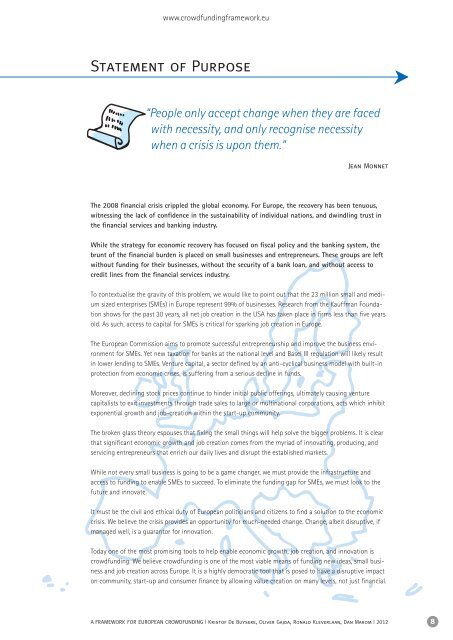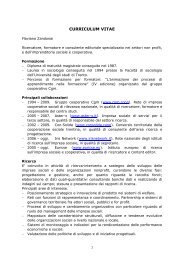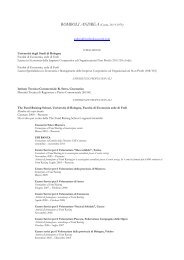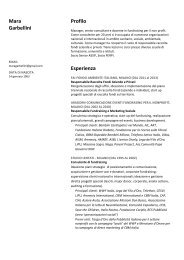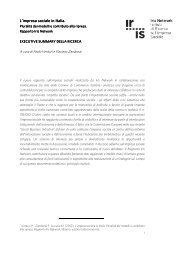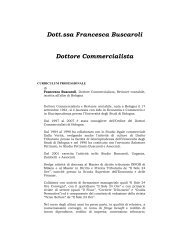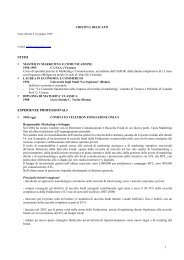A Framework for European Crowdfunding
A Framework for European Crowdfunding
A Framework for European Crowdfunding
Create successful ePaper yourself
Turn your PDF publications into a flip-book with our unique Google optimized e-Paper software.
www.crowdfundingframework.eu<br />
Statement of Purpose<br />
“People only accept change when they are faced<br />
with necessity, and only recognise necessity<br />
when a crisis is upon them.“<br />
Jean Monnet<br />
The 2008 financial crisis crippled the global economy. For Europe, the recovery has been tenuous,<br />
witnessing the lack of confidence in the sustainability of individual nations, and dwindling trust in<br />
the financial services and banking industry.<br />
While the strategy <strong>for</strong> economic recovery has focused on fiscal policy and the banking system, the<br />
brunt of the financial burden is placed on small businesses and entrepreneurs. These groups are left<br />
without funding <strong>for</strong> their businesses, without the security of a bank loan, and without access to<br />
credit lines from the financial services industry.<br />
To contextualise the gravity of this problem, we would like to point out that the 23 million small and medium<br />
sized enterprises (SMEs) in Europe represent 99% of businesses. Research from the Kauffman Foundation<br />
shows <strong>for</strong> the past 30 years, all net job creation in the USA has taken place in firms less than five years<br />
old. As such, access to capital <strong>for</strong> SMEs is critical <strong>for</strong> sparking job creation in Europe.<br />
The <strong>European</strong> Commission aims to promote successful entrepreneurship and improve the business environment<br />
<strong>for</strong> SMEs. Yet new taxation <strong>for</strong> banks at the national level and Basel III regulation will likely result<br />
in lower lending to SMEs. Venture capital, a sector defined by an anti-cyclical business model with built-in<br />
protection from economic crises, is suffering from a serious decline in funds.<br />
Moreover, declining stock prices continue to hinder initial public offerings, ultimately causing venture<br />
capitalists to exit investments through trade sales to large or multinational corporations, acts which inhibit<br />
exponential growth and job-creation within the start-up community.<br />
The broken glass theory espouses that fixing the small things will help solve the bigger problems. It is clear<br />
that significant economic growth and job creation comes from the myriad of innovating, producing, and<br />
servicing entrepreneurs that enrich our daily lives and disrupt the established markets.<br />
While not every small business is going to be a game changer, we must provide the infrastructure and<br />
access to funding to enable SMEs to succeed. To eliminate the funding gap <strong>for</strong> SMEs, we must look to the<br />
future and innovate.<br />
It must be the civil and ethical duty of <strong>European</strong> politicians and citizens to find a solution to the economic<br />
crisis. We believe the crisis provides an opportunity <strong>for</strong> much-needed change. Change, albeit disruptive, if<br />
managed well, is a guarantor <strong>for</strong> innovation.<br />
Today one of the most promising tools to help enable economic growth, job creation, and innovation is<br />
crowdfunding. We believe crowdfunding is one of the most viable means of funding new ideas, small business<br />
and job creation across Europe. It is a highly democratic tool that is posed to have a disruptive impact<br />
on community, start-up and consumer finance by allowing value creation on many levels, not just financial.<br />
A FRAMEWORK FOR EUROPEAN CROWDFUNDING | Kristof De Buysere, Oliver Gajda, Ronald Kleverlaan, Dan Marom | 2012<br />
8


